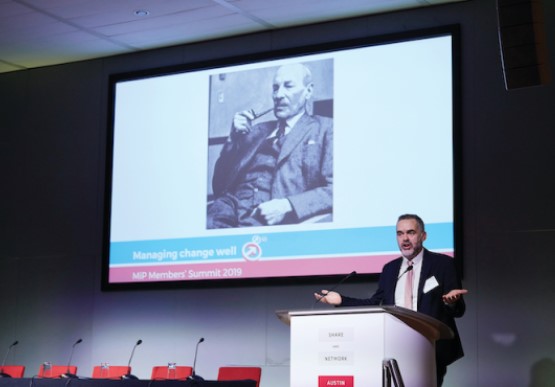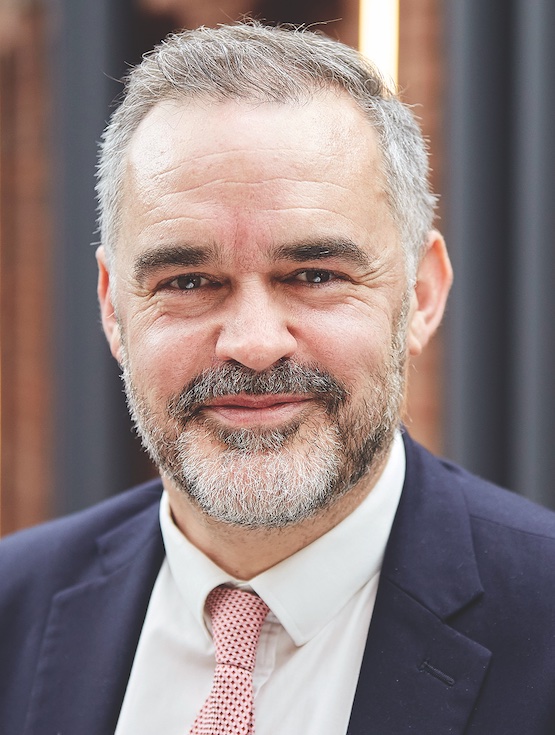Summit 2019: Managers need to respond to ‘toxic’ populism
MiP chief executive Jon Restell urges members to show true leadership in tackling toxic workplaces and preserving NHS values.

Managers must “learn and act together” to tackle toxic workplaces and preserve NHS values in a hostile political atmosphere, MiP chief executive Jon Restell told delegates in his keynote speech to MiP’s 2019 Members’ Summit.
Restell warned that the rise of “political populism” was a “profoundly challenging and disturbing development” which had created a potentially “toxic environment inside the NHS” to which managers needed to respond.
“The political culture is setting our weather inside the NHS,” he said. “Managers trying to tackle bullying are working in a setting where bullying is the normal political currency. Managers trying to deal with racism and sexism are working in a political culture where racism and sexism is sanctioned and openly used in debate.”
He cautioned delegates against “trying to respond with a populist edge of our own” or giving into the temptation of “disengaging from the public debate by slowly switching off to what’s happening”. Instead, he argued, managers need to look at what they can do individually and collectively to defend NHS values at work.
He said: “Many managers don’t think they can deal with racism and sexism in the workplace—that it’s a societal problem that’s bigger than them—but in reality there are things we can do by learning and acting together to change the culture in which we are operating in this country.”
MiP as a trade union will “give you the space to do that and to be yourself—to live your values and act and learn together,” he said. “We’re committed not just to take on the individual case but to take on the bigger issues too—but we need to be aware of the broader political context within which we are operating.”
Restell cited the post-war Labour prime minister Clement Attlee as an example of the kind of leader who had been lost to British public life. “He was completely uninterested in public relations and was the ultimate uncharismatic leader,” he said. “But he managed a group of Labour politicians who were complete egomaniacs for 20 years.
“He wasn’t an ideological socialist… but through social work in the East End of London he had developed a strong set of values which he applied pragmatically,” Restell added. “Attlee never walked away from difficult decisions. And he made life better for the people of this country. I think a lot of our political leaders have lost those qualities.”
|
MiP Chief Executive Jon Restell responds to Health Secretary’s package of NHS reforms.
15 November 2024
| By Jon Restell
News
|
|||||
|
Agenda for Change, introduced 20 years ago, was supposed to put an end to inconsistency and unfairness in how NHS staff are paid. But staff shortages and tight budgets mean many staff are now graded below the level of the work they’re doing. It’s time to modernise the system, says Rhys McKenzie.
07 October 2024
| By Rhys McKenzie
Feature
|
|||||
|
MiP has welcomed moves to speed up pay progression for Band 8 and 9 managers and tackle long-standing problems with the Agenda for Change pay system that deter staff from seeking promotion.
23 September 2024
| By MiP
News
|
|||||
|
Special Report: People in public-facing jobs are being confronted by more violence and abuse at work, and the NHS is at the sharp end. Existing policies are failing – we need a more co-ordinated and energetic approach to tackle the root causes and protect the staff who care for others.
18 September 2024
| By Craig Ryan
Feature
|
|||||
|
MiP has welcomed a 5% pay rise for very senior and executive senior managers in the NHS in England, after the UK government accepted the latest recommendations from the Senior Salaries Review Body (SSRB).
09 September 2024
| By MiP
News
|
|||||
|
MiP has welcomed the 5.5% pay rise for NHS staff on Agenda for Change as “a notable shift” and a “good starting point” for future negotiations.
04 September 2024
| By MiP
News
|
|||||
|
Related News
-

Job vacancy: MiP Assistant National Organiser
MiP is looking to recruit an Assistant National Organiser on a 14 month fixed term contract. Applications close: 4 March 2026.
-

FDA General Secretary Election 2026
Please find important information regarding the FDA General Secretary Election 2026 which MiP members may participate in.
-

Government proposal for sub-inflation pay rise “not good enough”, says MiP
Pay rises for most NHS staff should be restricted to an “affordable” 2.5% next year to deliver improvements to NHS services and avoid “difficult” trade-offs, the UK government has said.





